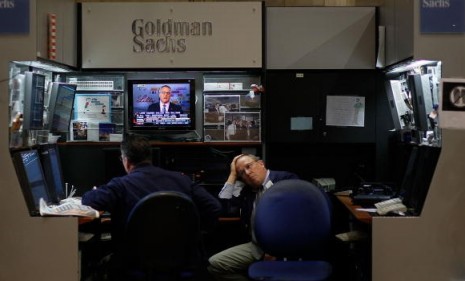Did Goldman Sachs provoke a world hunger crisis?
A nonprofit accuses the bank's traders of starving people by dramatically bidding up prices for wheat, corn and rice. Is that fair?

A free daily email with the biggest news stories of the day – and the best features from TheWeek.com
You are now subscribed
Your newsletter sign-up was successful
Wall Street giant Goldman Sachs apparently didn't end its PR troubles by settling a fraud lawsuit with regulators — now a British nonprofit is accusing the firm's traders of starving some of the world's poor by creating a speculative frenzy in food commodities. The World Development Movement has launched an online campaign accusing Goldman of spearheading commodities speculation that sent the prices of wheat, corn, rice, and other staples skyrocketing in late 2006, pushing 200 million people toward malnutrition and starvation. Goldman called the accusation "disingenuous and downright misleading." Who's right? (Watch a discussion about the alleged wrongdoing)
It's true — traders gambled away lives: Food wasn't scarce — speculators just made it too expensive for the poor to afford, says Johann Hari at Britain's Independent. Prices of rice and other staples traded on the futures markets rose by 80 to 320 percent, while other vital crops, including cassava and potatoes, barely went up at all. "The world's wealthiest speculators set up a casino where the chips were the stomachs of hundreds of millions of innocent people. They gambled on increasing starvation, and won."
"How Goldman gambled on starvation"
The Week
Escape your echo chamber. Get the facts behind the news, plus analysis from multiple perspectives.

Sign up for The Week's Free Newsletters
From our morning news briefing to a weekly Good News Newsletter, get the best of The Week delivered directly to your inbox.
From our morning news briefing to a weekly Good News Newsletter, get the best of The Week delivered directly to your inbox.
Stop blaming Goldman for capitalism's glitches: It's "absurd" to pin the blame for hunger on commodities traders, says Seth Freedman in Britain's Guardian. Protectionist farming subsidies in the U.S. and U.K. are just as bad, or worse, because "they allow subsidised commodities to be dumped in third-world countries, undermining domestic farming and hampering local growth." The World Development Movement is just trying to make Wall Street a "fall guy."
"In defence of cocoa futures trading"
A little re-regulation will solve this: In theory, futures trading can help farmers, says Zoe Brennan in Britain's Daily Mail, by letting them sell crops in advance at a fixed price, insulating them from the effects of bad weather, pests, and other risks. That worked fine until the 1990s, when deregulation allowed investment banks — rather than just buyers with a direct interest in the industry — get involved. Bring back the regulations, and the problem will go away.
A free daily email with the biggest news stories of the day – and the best features from TheWeek.com
-
 How to Get to Heaven from Belfast: a ‘highly entertaining ride’
How to Get to Heaven from Belfast: a ‘highly entertaining ride’The Week Recommends Mystery-comedy from the creator of Derry Girls should be ‘your new binge-watch’
-
 The 8 best TV shows of the 1960s
The 8 best TV shows of the 1960sThe standout shows of this decade take viewers from outer space to the Wild West
-
 Microdramas are booming
Microdramas are boomingUnder the radar Scroll to watch a whole movie